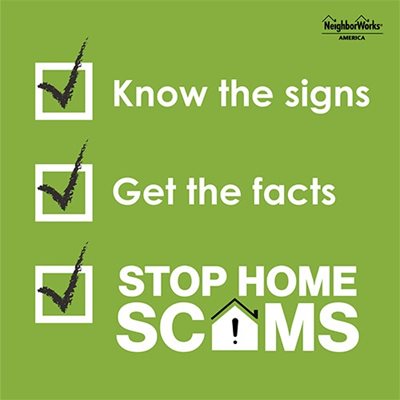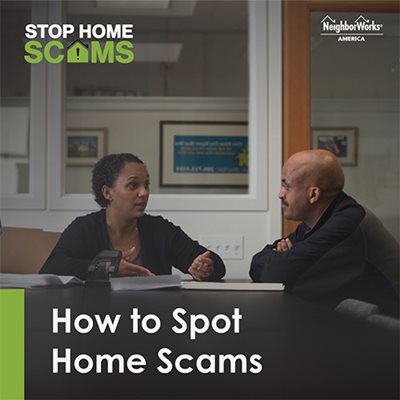NeighborWorks America led the launch this week of Stop Home Scams, a national, public education initiative aimed at bringing awareness to foreclosure and eviction scams targeting consumers. NeighborWorks engages a network of nearly 240 organizations with a focus on creating housing and strong communities; the very people these organizations help are also the people who are often targeted in scams.
It's a lesson Marietta Rodriguez, president and CEO of NeighborWorks America, recalls from the housing crisis of 2008, when 10 million people lost their homes. She says she wanted to be sure to use lessons from that crisis now, as COVID-19 exacerbates scam activity, to help consumers before it's too late. The campaign will help consumers find trusted help and report illegal activity to authorities. The goal is for consumers to know the signs, get the facts and stop the scams. More information can be found at stophomescams.org.
"We want to emphasize how important it is for consumers to know the signs of a housing scam and quickly report any scam activities," Rodriguez says. "The Stop Home Scams initiative is making it easier for homeowners and renters in distress to protect themselves and help shut down scammers."
 COVID-19, which caused many people across the country to shelter in place, has underlined the importance of having a safe place to call home. At the same time, the economic impact of COVID-19 has made housing security more uncertain. With forbearance relief programs scheduled to end and up to 21% of renters at risk of eviction, many families are seeking solutions – and finding themselves at risk.
COVID-19, which caused many people across the country to shelter in place, has underlined the importance of having a safe place to call home. At the same time, the economic impact of COVID-19 has made housing security more uncertain. With forbearance relief programs scheduled to end and up to 21% of renters at risk of eviction, many families are seeking solutions – and finding themselves at risk.The Stop Home Scams initiative makes it easier for homeowners and renters to protect themselves and help shut down scammers, says Rodriguez, who was vice president of National Homeownership and Lending Programs at NeighborWorks during the 2008 crisis. "We want to emphasize how important it is for consumers to know the signs of a housing scam and quickly report any scam activities," she says. "This campaign is based on the belief that knowledge and action are the best defense against falling prey to scammers."
Three key consumer tips for avoiding scammers include:
- Avoid promises of success or anyone who guarantees to assist with payment or prevent foreclosure or eviction.
- Avoid companies that tell you to stop paying your rent or mortgage. Being told to stop paying is a sure sign of a scam.
- Reach out to your landlord or mortgage company when you are struggling with your monthly payments, to ask any questions or share concerns about your home
While the initiative includes information for everyone, it focuses on groups that traditionally experience high levels of scam activity, including seniors, low to moderate income families and communities of color. It is a response to economic challenges during COVID-19 and the increasing need to support residents and communities.

As with other projects this year, NeighborWorks received a significant contribution from the Wells Fargo Foundation. The organizations are offering grants to NeighborWorks network organizations that are doing the work to educate their communities about potential scams.
"We believe this effort to prevent housing scams is particularly important during a time when far too many families, including people of color impacted by the economic downturn caused by COVID-19, are facing financial challenges," says Eileen Fitzgerald, head of housing affordability philanthropy with the Wells Fargo Foundation. "Protecting people from being compromised by scam attempts is important to helping keep people housed in a safe and affordable place they can call home."
Financial Security Program Coordinator Joel Niño, Jr., who works with come dream. come build (cdcb), in Brownsville, Texas, says his organization has been reaching out to the public, providing financial literacy and posting videos related to scams. A grant from NeighborWorks America, in partnership with the Wells Fargo Foundation, allows cdcb to do more social media outreach and increase its reach, drawing attention to the dangers of scams.
"We want people to know what to look out for," Niño says, adding that the Stop Home Scams initiative is in line with cdcb's efforts and goals to create sustainable communities and educate future homeowners. During the pandemic, Niño says, worried clients have already called their housing counseling and lending departments to report fake offers of loan assistance.
"There's a lot of that going on," he says. "We're telling the general population: If you're getting calls asking for sensitive information, no one's going to be asking for that over the phone." The city of Brownsville has already posted electronic billboards, reminding residents to be aware of scams.
"We're trying to keep ahead of it," Niño says, projecting, like Rodriguez, that an end of forbearances will bring even more scams. He expects scams to revolve around stimulus checks as well as mortgages. "With an end to protections, we'll see a lot of desperate people," he says. "If they hear something they want to hear from a scammer, it's much easier for them to fall victim to people trying to take their information and abuse the little knowledge they may have."
His advice to other network organizations? "The main thing is outreach," Niño says. "You want to get the word out there in whatever way you can." He recommends emailing clients on what to look out for, and to post on social media as well. "The main thing is knowing," he says. "If you don't know what scams are going on, and to be alert, you're more likely to fall prey."
Knowledge is at the core of the NeighborWorks campaign. Scam activity is especially prevalent in major U.S. cities and their surrounding areas, particularly in California, New Jersey and Pennsylvania. Additional partners assisting NeighborWorks in this educational effort are the National Fair Housing Alliance and National Foundation for Credit Counseling.
For more information about the Stop Home Scams campaign, including the additional tips and guidance for avoiding scammers, visit www.StopHomeScams.org.

